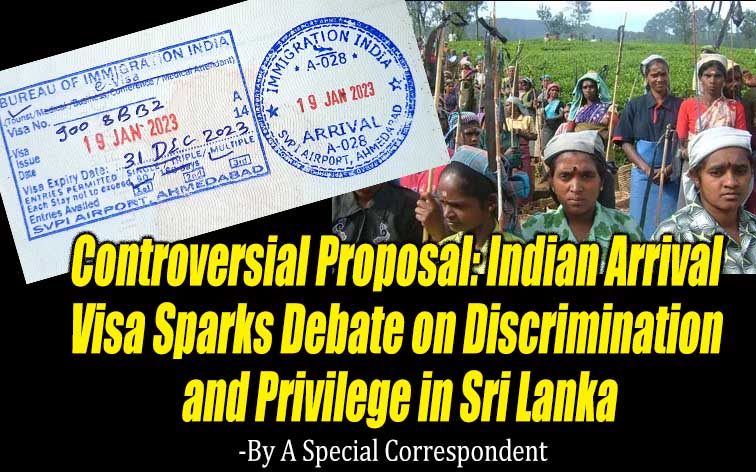-By A Special Correspondent

(Lanka-e-News -12.Jan.2024, 11.00 PM) In a surprising move, the Indian government is considering the implementation of an Indian Arrival Visa exclusively for individuals of Indian origin residing in Sri Lanka, specifically targeting Tamils in the upcountry region. While this proposal aims to ease travel for a significant population, it has sparked a heated debate over potential discrimination against other communities in Sri Lanka and the perceived privilege granted to Indian-origin Tamils.
Currently, Indian citizens enjoy the privilege of visa-free travel to Sri Lanka, despite concerns about a substantial number of Indians overstaying their welcome in the country. On the flip side, Sri Lankan citizens are required to apply for an e-visa and pay a fee to enter India, showcasing a stark contrast in the visa policies between the two nations.
The proposed Indian Arrival Visa would ostensibly benefit thousands of Indian-origin individuals residing in the upcountry part of Sri Lanka. Historically, these individuals were brought under British rule to work in the plantation sector. While the intention may be to address the needs of this specific community, concerns are rising over the potential discrimination against other ethnicities and communities in Sri Lanka.
Critics argue that this move contradicts the principles of equality and non-discrimination, raising questions about the fairness of such a targeted visa policy. The proposal has ignited discussions about the Neighbourhood First policy of the Indian Government, which emphasizes building strong ties with neighboring countries. However, critics argue that this policy is losing credibility, particularly in the wake of strained relations with countries like Maldives and Nepal due to perceived heavy-handed tactics.
One of the main arguments against the proposed Indian Arrival Visa is the lack of reciprocity in visa policies between India and Sri Lanka. Advocates for equal treatment point out that while India is eager to build a defense relationship with Sri Lanka, it has not reciprocated by allowing Sri Lankans to travel to India without the burden of a visa.
Furthermore, the proposed visa policy raises questions about India's influence in Sri Lankan politics. Critics argue that the Indian government's desire to exert political influence in Sri Lanka is inconsistent with its refusal to grant visa-free travel to Sri Lankan citizens. This incongruity has sparked skepticism about India's commitment to fostering a genuine and equal partnership with its neighbor.
In the larger context, proponents of a more inclusive visa policy emphasize the need for mutual respect and cooperation between India and Sri Lanka. They argue that facilitating easier travel between the two nations would not only strengthen cultural and economic ties but also contribute to regional stability.
As the debate over the proposed Indian Arrival Visa intensifies, it remains to be seen how the Indian government will address concerns of discrimination and privilege. The outcome of this deliberation will undoubtedly have far-reaching implications for the relationship between India and Sri Lanka, shaping the narrative of cooperation and equality in the region.
---------------------------
by (2024-01-12 18:10:35)
Leave a Reply